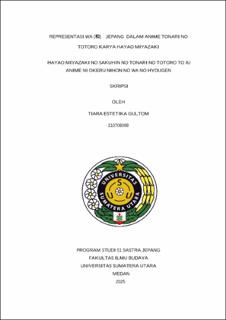Representasi Wa (和) Jepang Dalam Anime Tonari No Totoro Karya Hayao Miyazaki
The Representation of Japanese Wa (和) in the Anime Tonari no Totoro by Hayao Miyazaki

Date
2025Author
Gultom, Tiara Estetika
Advisor(s)
Nandi
Arfianty, Rani
Metadata
Show full item recordAbstract
This study aims to examine the representation of Wa (和), the principle of harmony in Japanese culture according to Shinto beliefs, in the anime Tonari no Totoro by Hayao Miyazaki. The research is grounded in the importance of harmony between humans, nature, and spiritual beings (kami) in Shinto cosmology and how this harmony is reflected in visual fiction works. This research employs a qualitative descriptive method with a literary sociology approach and Stuart Hall’s theory of representation. The data were analyzed through the identification of intrinsic elements (theme, characters, setting, message) and symbolic scenes in the film that illustrate the relationship between humans, nature, and spirits. The findings show that Wa is represented through the warmth of the Kusakabe family’s relationships, the children’s interactions with Totoro and other spiritual beings, and the symbolism of sacred spaces such as forests, shrines, and the camphor tree. The central theme highlights the importance of harmony between humans, nature, and spiritual beings (kami). The setting is rural Japan, enriched with spiritual elements such as forests, shrines, and sacred trees (shinboku). The characters are portrayed as having sincere and open hearts to ward the presence of spiritual beings. The message conveyed is the importance of maintaining balance in life between fellow humans, nature, and the spiritual world. In the Shinto perspective, Wa is seen as the relationship between humans, nature, and spirits; as a foundation for social and family life; and as Musubi—a spiritual bond and transformative energy.
Collections
- Undergraduate Theses [605]
